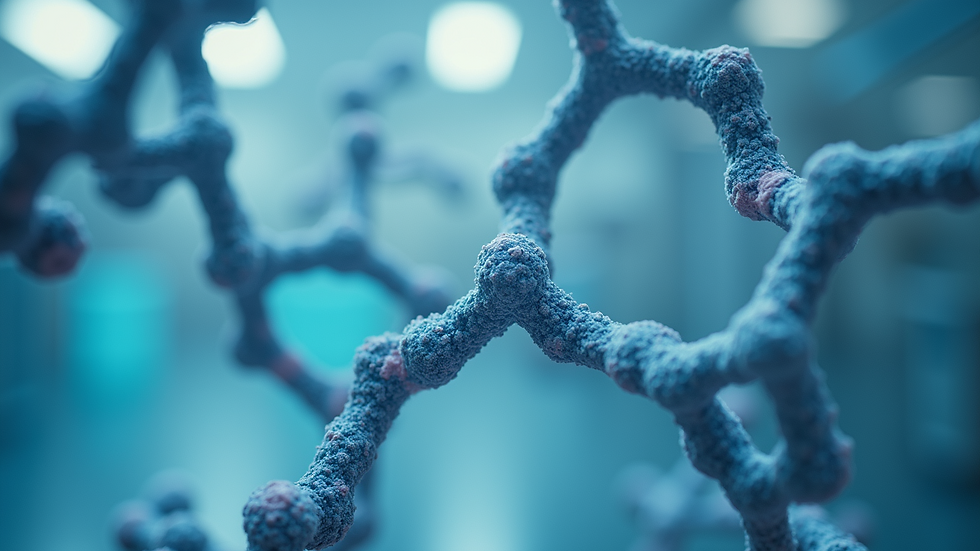Exploring Breakthroughs in Biotechnology Today
- PeptideX

- May 31
- 3 min read
In recent years, biotechnology has experienced exponential growth, leading to revolutionary advancements that impact various sectors, from healthcare to agriculture. Scientists and researchers are making remarkable breakthroughs that promise to reshape our understanding of biology. This blog post will explore some significant developments within the biotechnology landscape today, highlighting innovations that are transforming lives.
Biotechnology Breakthroughs
Biotechnology encompasses a wide range of techniques and processes that use living organisms or their derivatives to create products and solve problems. Several breakthroughs have emerged in areas like genetic engineering, synthetic biology, and biomanufacturing. One notable example is CRISPR-Cas9, a method that allows precise editing of DNA. This gene-editing technology enables researchers to make targeted changes in the DNA of living organisms, leading to potential cures for genetic disorders.

Another breakthrough worth mentioning is the use of monoclonal antibodies. These lab-created molecules can mimic the immune system's ability to fight pathogens. Monoclonal antibodies are being used to develop treatments for various diseases, including cancer and autoimmune disorders. Recent successes have led to improved survival rates for cancer patients and have opened new pathways for treatment strategies.
The Role of Synthetic Biology
Synthetic biology has emerged as a powerful branch of biotechnology that combines biology and engineering principles. It enables scientists to design and construct new biological parts and systems. One exciting application of synthetic biology is creating biofuels from algae. Researchers are engineering algae strains to produce oil that can be converted into biodiesel, offering a sustainable alternative to fossil fuels.
Moreover, synthetic biology is influencing agriculture. Genetically modified organisms (GMOs) can resist pests or tolerate harsh environmental conditions. Crops engineered in this way can help address food security challenges in a rapidly growing global population. For example, scientists have developed genetically modified corn that can withstand periods of drought while maintaining yields.

Advancements in Personalized Medicine
Personalized medicine is another area where biotechnology has made substantial strides. This approach tailors medical treatments to individual characteristics of each patient. By using genetic information, healthcare providers can select the most effective therapies based on a person's genetic makeup. For instance, pharmacogenomics studies how genes affect a person’s response to drugs, helping doctors prescribe the right medication at the right dosage.
One practical example of personalized medicine is the development of targeted cancer therapies. These treatments focus on specific genetic mutations found in a patient’s tumor, resulting in more effective and less toxic interventions. This innovative approach represents a significant shift from the traditional one-size-fits-all cancer treatment methods.

Biotechnology’s Impact on Agriculture
Biotechnology isn’t only revolutionizing healthcare; it is also crucial for sustainable agriculture practices. As climate change poses increasing challenges, biotechnological innovations are aiding farmers in developing resilient crops. For instance, genetically modified varieties of soybeans and cotton are engineered to withstand herbicides, allowing farmers to control weeds more effectively while reducing their dependence on harmful pesticides.
Biotechnology also plays a role in enhancing crop nutrition. Scientists are working on biofortification, which involves enriching crops with nutrients that can improve human health. An example is Golden Rice, which is engineered to contain high levels of beta-carotene, a precursor of vitamin A. This innovation can significantly impact areas where Vitamin A deficiency is prevalent, helping to reduce related health issues.
Future Trends in Biotechnology
The future of biotechnology looks bright, with ongoing research and development promising even more groundbreaking advancements. One key trend is the integration of artificial intelligence (AI) with biotechnology. AI algorithms can analyze complex biological data more quickly and accurately than humans, leading to faster drug discovery and development processes. For example, AI models can predict how different compounds will interact with specific biological targets, enabling researchers to prioritize the most promising candidates for clinical trials.
Another trend in biotechnology is the growing emphasis on sustainable practices. Biotechnological approaches are increasingly being utilized to develop eco-friendly products. For instance, bioplastics made from renewable resources are gaining traction as alternatives to traditional petroleum-based plastics. These innovations not only reduce waste but also lower the carbon footprint associated with plastic production.
Embrace the Future of Biotechnology
As we explore breakthroughs in biotechnology today, it is essential to acknowledge the transformative power of these innovations. From gene editing and personalized medicine to sustainable agriculture, the possibilities are limitless. By fostering these developments, we can solve some of today's most pressing challenges.
To stay informed, consider exploring more about therapeutic innovations. Embracing these advancements can lead to not only improved health outcomes but also more sustainable practices across various industries. The future is bright for biotechnology, and we're only just beginning to uncover its potential.



Comments